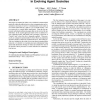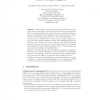620 search results - page 29 / 124 » The computational power of population protocols |
P2P
2005
IEEE
15 years 3 months ago
2005
IEEE
We address the problem of highly transient populations in unstructured and loosely-structured peerto-peer systems. We propose a number of illustrative query-related strategies and...
GECCO
2005
Springer
15 years 3 months ago
2005
Springer
This paper investigates the effects of two different communication protocols within an artificial society, where communication and cooperation is necessary to survive. Communicat...
CRYPTO
2005
Springer
15 years 3 months ago
2005
Springer
Forgery and counterfeiting are emerging as serious security risks in low-cost pervasive computing devices. These devices lack the computational, storage, power, and communication r...
JSA
2000
14 years 9 months ago
2000
Portable products are being used increasingly. Because these systems are battery powered, reducing power consumption is vital. In this report we give the properties of low power d...
IWSEC
2007
Springer
15 years 4 months ago
2007
Springer
Abstract. Pairing-based cryptography (PBC) has enabled the construction of many cryptographic protocols. However, there are scenarios when PBC is too heavyweight to use, such as wh...


